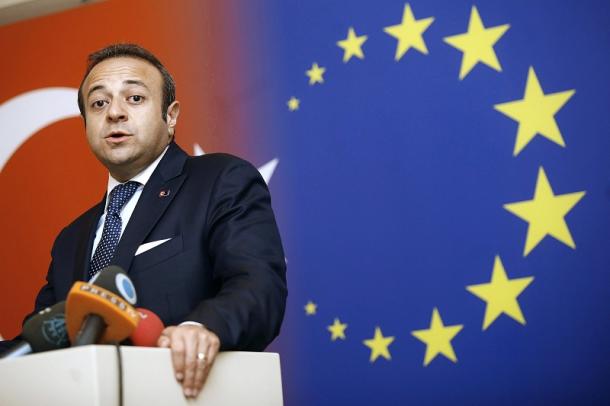Turkey: Harsh criticism against draft law for prevention of violence against women
 Turkey in a struggle for catching up with the civilized societies in the western world frequently faces some truly disappointing situations as with the “VIOLENCE AGAINST WOMEN ” and discussions about the law “SUPPOSED” to prevent it..
Turkey in a struggle for catching up with the civilized societies in the western world frequently faces some truly disappointing situations as with the “VIOLENCE AGAINST WOMEN ” and discussions about the law “SUPPOSED” to prevent it..
A journalist has written a very interesting article (interview) about the issue which is “much” worth reading.. Editor, BTT
The protection of the family was once more chosen instead of the protection of women..
Academic Ayata from the Bilgi University Human Rights Law and Research Centre evaluated the amendments of the law against violence against women for bianet: “Even the gains of the current law have been taken back”.
Çiçek TAHAOĞLU cicek@bianet.org
Istanbul BİA News Center
05 March 2012, Monday
The title and contents of the draft law related to the prevention of violence against women were amended once more. Women organizations and the Ministry of Family and Social Policies have been working on the draft bill for several months.
The draft bill was opened for signature at the Council of Ministers on 31 January. On 24 February, it was submitted to the Presidency of the Parliament. In the meantime, the title of the proposal was amended from “Draft Bill for the Protection of Women and Family Members from Violence” to “Draft Bill to Protect the Family and for the Prevention of Violence against Women”.
The bill is planned to be enacted on 8 March. It was debated in the Parliamentary Commission for Equal Opportunities of Women and Men (KEFEK) on 1 March before it was forwarded to the Ministry of Justice the same day.
Gökçeçiçek Ayata from the Bilgi University Human Rights Law and Research Centre pointed out significant differences between the text submitted to the Ministry of Justice and its previous version sent to the Council of Ministers. “Gains of Law No. 4320 as currently in force have even been taken back. We see a serious turnaround. The protection of the family was once more chosen instead of the protection of the life of women”, Ayata criticized.
She reminded that the draft law was amended several times without informing the women organizations which were actually part of the process. The law was not prepared the way it would have been necessary because the ministry and the government pushed for an immediate enactment of the law, Ayata stated.
She added, “Women organizations worked hard on the bill because it was amended many times at each and every stage. Yet, we do not have a text that contains the demands of women. The women had to voice their demands dozens of times with every amendment and they had to put a lot of effort to have these demands included in the draft bill. In fact, this openly displays the government’s stance on women and their approach towards the struggle regarding violence against women”.
“The government does not take this issue seriously. Instead of designing a law that meets the effective and existing requirements again they try to make a law that is primarily aimed at the protection of the family and just saves the image”.
What was amended?
* References to international agreements were removed from the section on the purpose and scope of the draft bill.
Ayata explained that the law was designed according to Article 90 of the Constitution that takes international agreements as a basis. This was important to solidify the standards included in those laws, Ayata underlined. “Turkey has been a member of the Committee on the Elimination of Discrimination against Women (CEDAW) for years but [the government] did everything possible in order not to implement the related requirements. This was exactly the reason why references to international agreements were included in the part on the basic principles”.
* The section on definitions was reduced from eleven to three paragraphs by the removal of definitions of domestic violence, violence against women or social gender for example.
* Regarding amendments of the chapter about “Preliminary injunctions, notification and confidentiality”, again women have to apply for a preliminary injunction every six months. The draft prepared by the women’s organizations anticipated an indefinite injunction in order to avoid the situation that women have to apply for injunctions continuously.
* Some of the injunction decisions are being taken away from judges and transferred to civilian authorities. Ayata emphasized that all authorities were bound by the injunction decisions given by judges. “What is going to happen if the civilian authority is not going to implement the obligations of the law? Will the women file a complaint about the civil authority and wait for the outcome?” Ayata questioned.
* The term “without searching for a written documentation of violence” was replaced by the addition “The judge gives a decision for injunction without a hearing and if necessary without searching for documentation or evidence with regard to the violence applied”.
Ayata commented, “The term ‘if necessary’ means that evidence will be collected if the judge deems it necessary. We said from the very beginning that violence is not only physical. Collecting evidence and holding a hearing in case of physical violence causes delays and leads to the situation that the woman remains under acute risk for a longer time. Searching for evidence becomes the basis and refraining from searching for evidence will be an exception”.
* Concerning the article about Violence Prevention and Monitoring Centres, the provision to “preferably employ female staff” was removed.
Ayata claimed that regulations related to these centres were also problematic in the former version of the bill. The most important demands for women centres were to employ women staff, avoid discrimination, provide multi-lingual services 24 hours seven days a week and having everything under one roof.
This means that victims of violence are provided with medical and judicial support as well as psychological counselling and necessary housing solutions by directing them to shelters. “The centres as anticipated in the draft law lack a prevention of violence, a correspondent coordination and support after the experience of violence” Ayata said.
* The provisional article to establish Violence Prevention and Monitoring Centres in 14 provinces with the highest number of population within two years was removed.
Ayata deemed this amendment an obstruction before establishing these centres while they are needed in other cities. Removing a defined period of time from the proposal puts the future of the centres in a vague situation.
Ayata drew attention to a reduction of staff of the centres from 5557 to 362 employees. “The pruning of staff makes the centres non-functional even before they can be established” she criticized.
* The paragraph related to the development of a Violence Hotline according to the aims of the draft was removed.
* The paragraph regarding social gender training to be given to public personnel has been lifted as well as certain additions related to the training of police forces.
In practice, the phrase “training about the topics of social gender, women human rights and gender equality” as included in the former proposal was amended to “training related to services as defined in the law”.
Ayata remarked, “It was the women’s demand that not only police forces should be trained but that also involved judges and prosecutors should be trained regarding gender equality, social gender, ban of discrimination and concepts that have been removed from the section of the law about definitions”.*
The sentence “In case of violence or danger of violence everybody can inform official authorities or concerned departments about the situation” was removed from the chapter on Notification. This means that precautions can only be taken upon the application of the person who was treated violently.
According to Ayata, this application isolates the women. “The women cannot reach support or they are afraid even though they are in need for support. They might not know the law or where to apply to. This regulation is problematic because it blocks [support]”. (ÇT)
Çiçek TAHAOĞLU
cicek@bianet.org
Istanbul BİA News Center
05 March 2012, Monday




